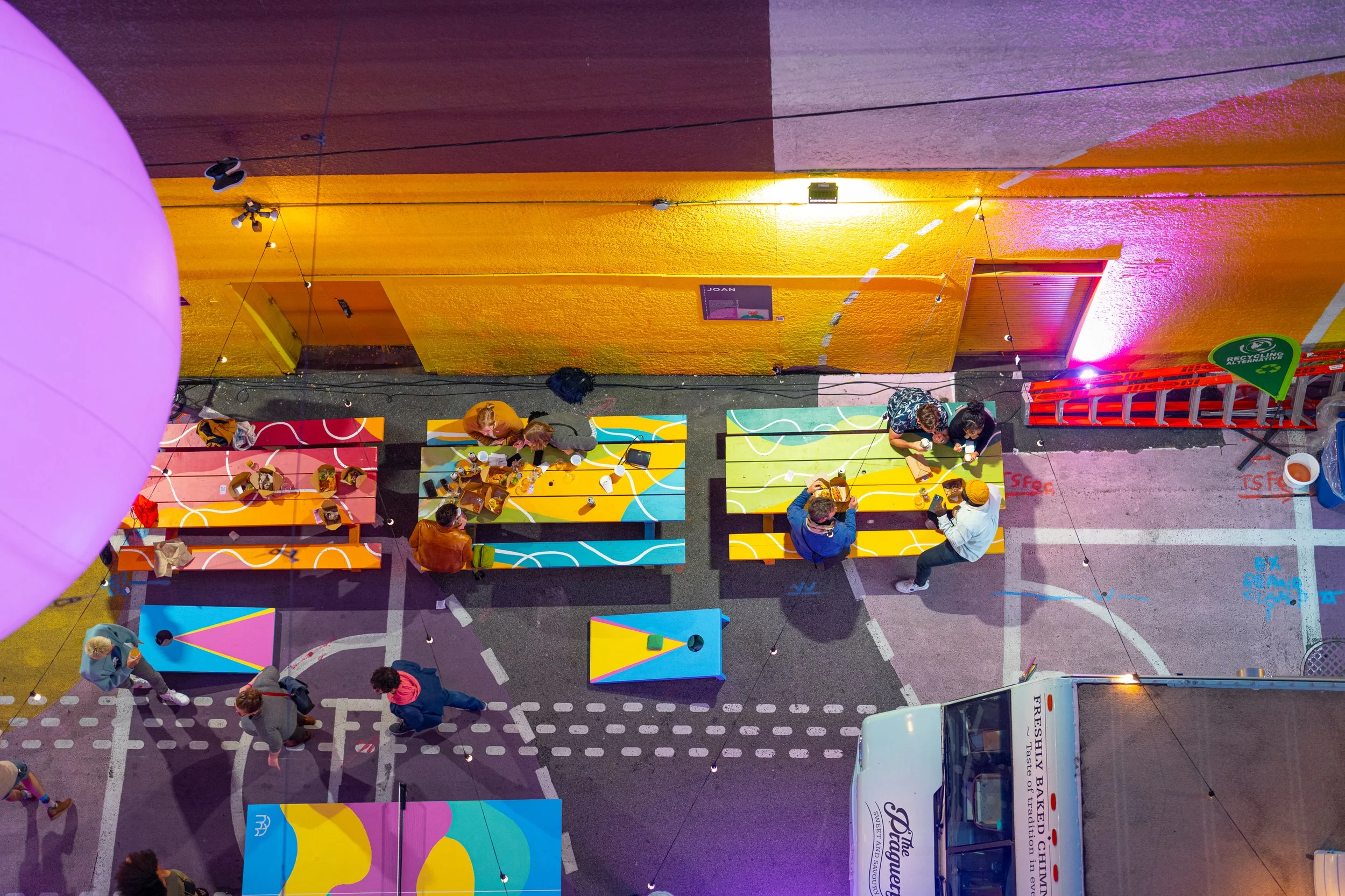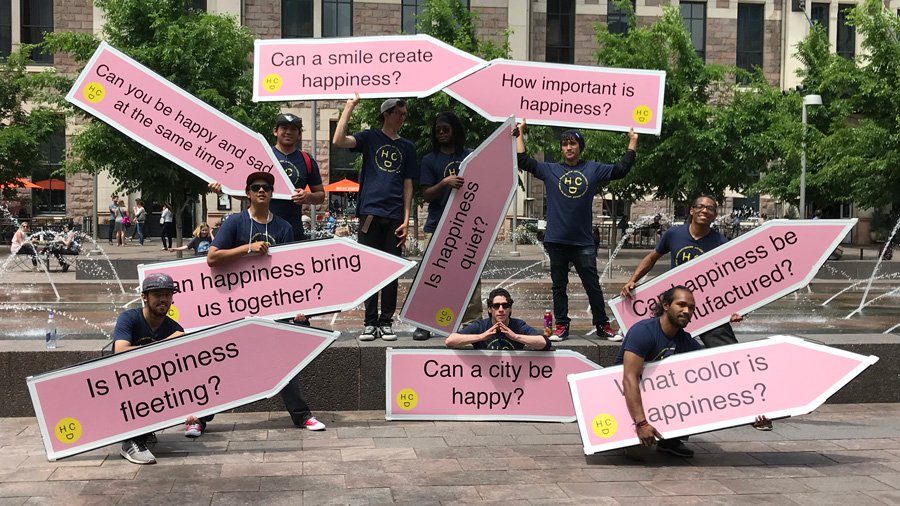Public Life Study tool
Measure how people feel and act in shared spaces, using Happy Cities’ award-winning methodology.
Introducing: A new tool to study public life
Since the pandemic, public space projects have gained new life. Cities, planners, and community members alike recognize that shared spaces are critical to our health and wellbeing.
But what value do public spaces really add to our communities? How do we know when these spaces are successful or not?
Happy Cities’ Public Life Study offers a flexible, low-barrier method for community organizations, planners, and residents to measure changes in health, happiness, and inclusion—and advocate for greater investment in shared spaces.
Scroll down to explore the tool ⬇️
Public spaces influence how we feel
Multiple studies show a strong relationship between the emotions of residents and long-term success of streets and cities. Did you know…
Shared outdoor spaces with plants and other natural features can reduce stress and loneliness.
People are more likely to spend time in and feel positive towards places with art, play equipment, and seating.
People are more trusting and feel a stronger sense of community at plazas compared to regular street blocks.
Our Public Life Study tool can help you identify these tangible ways that public space impacts community wellbeing. By releasing the tool for free, we aim to build community capacity, increase access to public space data, and support greater investment in placemaking across Canada.
An award-winning methodology
We’ve spent years building and refining our Public Life Study tool, using an evidence-based approach to measure social inclusion, trust, and connection in shared spaces.
Happy Cities received the 2020 Healthy Communities Planning Award for Planning Excellence, from the Canadian Institute of Planners, for our Public Life Study of the City of Vancouver’s Pavement-to-Plaza program.
Now, we’re releasing the tool for free.
Because great public spaces are for everyone.
“An excellent planning study that incorporates good methodology to look at people’s sense of wellbeing in the public realm, including safety.”
“A meaningful improvement in the way planners can assess public realm interventions.”
“A strong basis in research and scientific approaches to evaluation.”
Get started!
The Public Life Study is easy to do and can be tailored to meet your organization’s goals and capacity. There are four simple steps:
Fill out the form on this page to receive the methodology and materials you will need to complete your Public Life Study.
Conduct your Public Life Study!
Send us your results to receive a free analysis report from Happy Cities.
Share your findings!
Stories
“Happy Cities’ Public Life Studies offered us an innovative way to evaluate the wellbeing impacts of our temporary street transformations during the first summer of 2020, as part of our Streets for People initiative. Their evidence-based approach helped us make design adjustments quickly and determine which transformations had the potential to become permanent.”
— Lisa LeBlanc, Director of Engineering, City of New Westminster
Frequently asked questions
-
The Public Life Study collects two types of data:
Behaviour observations: Quantitative data is collected through observation about who is using a space and what they are doing there.
Intercept surveys: Subjective data is collected through a short wellbeing survey that intercepts people to ask them how they feel in a given space (measuring qualities such as sociability, trust, and belonging).
These data help you understand who is using the space, what they do in the space, and how they feel while there. For example, in our study of Vancouver's Pavement-to-Plaza program, we found that women felt safer and more comfortable socializing in newly created public plazas, compared to at regular street blocks nearby.
The data you collect can help inform future design and programming improvements, and can even help build the case for greater investments in public space—in communities worldwide.
-
You can study any space—like a street, plaza, park, patio, sidewalk, or otherwise. However, the Study is primarily designed to help you assess a space that has been transformed through some kind of placemaking intervention (like a design change or events programming). In this way, you can study a 'transformed' space and compare your results with a control site (either, the site before the transformation takes place, or a comparable 'non-transformed' site nearby).
-
Once you fill out the form above, you will receive the link to download all instructions and worksheets you need to complete the Public Life Study.
In addition, the Study will require a small amount of your organization's resources (staff or volunteer time) to collect the data. We recognize that many organizations have limited capacity. As such, we've designed the Study to be flexible to meet your team's needs (for example, you may opt to reduce the number of hours spent on site if you want to conduct a smaller study).
Typically, organizations could expect to have at least two staff or volunteers conduct the Study together.
-
Typically, we expect the study will take:
Approximately 2 hours to plan your Study (e.g. what site you will study, what times of day you will visit, who will conduct data collection)
Approximately 4-6 hours of staff or volunteer time to collect data (split across several 1-2 hour sessions)
Approximately 2 hours of time to digitize your data
After these steps are complete, you can submit your data sheet to Happy Cities to receive a free analysis in return. Should you wish to complete your own data analysis, that may require additional staff time from your organization.
-
Since the pandemic, interest in public spaces has grown. Communities big and small recognize the vital role that public spaces play in supporting our community wellbeing. Yet, we have relatively little data to measure exactly which kinds of public spaces are most successful.
Happy Cities was motivated to release our Public Life Study tool for free, because we've heard from placemakers that communities need simple ways to measure the impacts of their public space projects—and because great public spaces are for everyone.
We are asking organizations who use the tool to consider sharing their results back with us, so that we can start to build a national database of public space data. We aim to support community-led public space transformations by:
Sharing learnings through stories, workshops, and other publicly accessible formats.
Gathering evidence and data to advocate for greater investment in public spaces and placemaking.
Making the data available to researchers for non-commercial uses to help share learnings and generate greater knowledge around the wellbeing benefits of public spaces.
-
Yes!
Happy Cities is pleased to offer a free analysis report when you submit your data. The free report is currently available to one Study per organization, per year.
Please fill out the form on this page to receive your instructions and learn how to conduct your own Study.
If you are interested in working together to conduct your Study or would like to discuss greater support with your data analysis, please email us: info@happycities.com
-
The Public Life Study can generate evidence and support to inform many kinds of projects, both small and large-scale, including:
Public space design improvements
Public space events and programs
Temporary or permanent public realm transformations
Converting road space into space for people
Initiatives to make public space more equitable and inclusive
Active transportation improvements
Place-based retail studies
Downtown revitalization projects
And many more!
Public Life Studies in action
“Happy Cities helped us measure the wellbeing impacts of our Pavement-to-Plaza program, and reinforce our commitment to adding more plazas across all neighbourhoods in Vancouver. We were able to see that people felt more trusting and open to new connections at plazas, and also identified strategies to help ensure inclusion for all community members in public space.”
— William Dunn, Planner, City of Vancouver


























